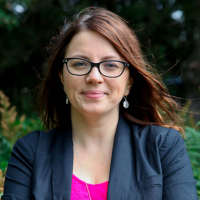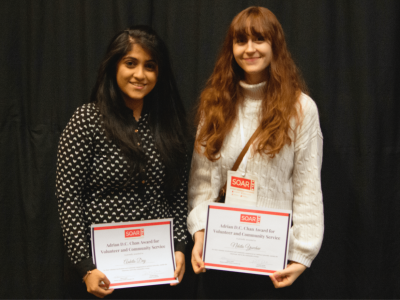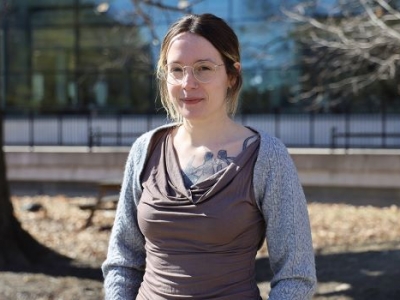–The following story was written by Ebere Ahanihu
 The care of people with intellectual disabilities, and the impact of social policy on their lives and families, is one of the themes of Anna Przednowek’s PhD research in Carleton University’s School of Social Work.
The care of people with intellectual disabilities, and the impact of social policy on their lives and families, is one of the themes of Anna Przednowek’s PhD research in Carleton University’s School of Social Work.
Przednowek is challenging the mainstream discourse in policy-making that suggests people with intellectual and developmental disabilities need care and, therefore, are incapable of providing care and support to other people in their lives.
In Ontario, argues Przednowek, these people no longer live in institutions and yet society and policy- makers still do not view them as citizens embedded in care relations with other people.
“What we have now,” she says, “is not exactly ‘community living.’” Instead, she contends, many people with intellectual disabilities live within a “care constellation’’ that includes parents, extended family members and care providers.
Przednowek’s research approach is unique in one important respect. It challenges the traditional way of undertaking research about people with intellectual disabilities by relying solely on voices of family members and care providers.
Her approach involves not only the voices of parents, other family members and paid care providers, but also individuals with intellectual disabilities themselves. Her research seeks to understand how the lives of people with intellectual disabilities are intertwined with those of their family members and shaped by socioeconomic status, the presence and age of parents, and whether or not the person has siblings, partners or other extended family members.
One of the key conclusions of her research is that people with intellectual disabilities actually provide care and support to people in their lives, including their partners, aging parents, and other extended family members, as well as pets in their homes.
Przednowek’s thesis is the product of more than 15 years of experience working with people who have intellectual and developmental disabilities. Her clinical work was the foundation of her interest in supportive counselling and behavioral interventions for individuals with complex care needs and their paid and unpaid caregivers.
She developed training workshops and consultations for family care providers, foster parents, volunteers and professionals.
After completing a Master of Social Work degree in 2012, she wanted to understand more fully the impact of social policies on the lives of people with intellectual disabilities and their families, applying to Carleton for doctoral studies in fall 2013. At the School of Social Work, under the supervision of Prof. Susan Braedley, her research is bringing together her clinical work experience and the study of policies that affect the lives of people with intellectual disabilities and those of their care providers.
As much as she believes that policies can be helpful, she is also mindful of their constraining effect. In this regard, her ultimate aim is to start a dialogue in social work practice and care scholarship on the role of people with intellectual and developmental disabilities in the provision of care.
To find out more about the PhD program in Social Work, click here.
Thursday, April 16, 2020 in Grad Student Research, News
Share: Twitter, Facebook




